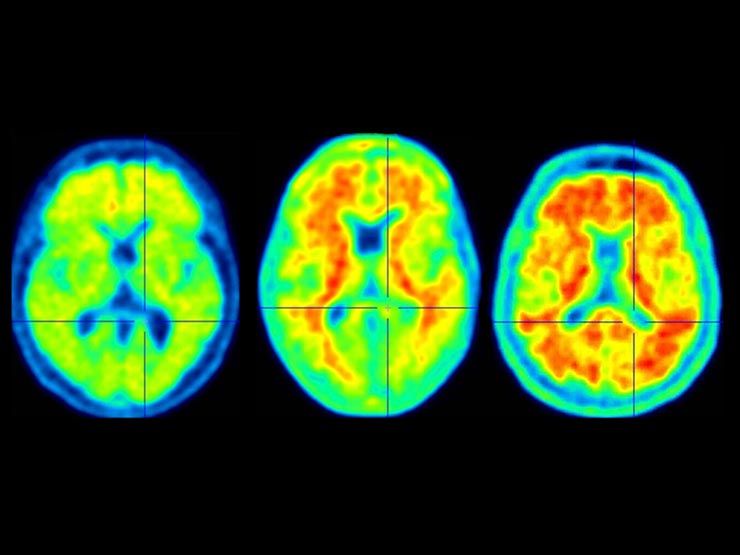What is Alzheimer’s Disease?
What is Alzheimer’s Disease?Alzheimer’s disease is a progressive neurological disease in which brain cells die and the brain shrinks. The condition gradually destroys memory and thinking skills, which over time affects a person’s ability to hold conversations, problem-solve, and carry out daily tasks.
Alzheimer’s disease is the most common cause of dementia, accounting for over 60 percent of dementia cases. Alzheimer’s disease affects up to 6 million Americans, and older age is a significant risk factor. Most people with the condition are age 65 or older, though symptoms can begin earlier in some cases.
Dementia vs. Alzheimer’s disease
Dementia is a general term that describes a diminished ability to think, remember, and reason. Dementia is not a single disease but is instead a group of medical conditions or disorders that result in mental decline. Alzheimer’s disease is a specific medical disorder that causes dementia as it gradually damages brain tissue.
Types of Alzheimer’s Disease
TypesThere are different types of Alzheimer’s disease, classified by age of onset and whether genetics are involved.
Types of Alzheimer’s disease include:
- Early-onset Alzheimer’s disease is also known as younger-onset Alzheimer’s disease. This condition affects people under the age of 65 and is uncommon, accounting for only about 5 percent of cases. Most people with early-onset Alzheimer’s disease are in their 40s or 50s when they start experiencing symptoms.
- Familial Alzheimer’s disease (FAD) is a rare genetic disorder, accounting for less than 1% of all Alzheimer’s cases. Most people who have early-onset Alzheimer's have FAD.
- Late-onset Alzheimer’s disease affects people over the age of 65. This is the most common type of Alzheimer’s disease. Research is underway to determine if a particular gene is responsible for late-onset Alzheimer’s disease.
Stages of Alzheimer’s Disease
StagesAlzheimer’s disease develops gradually over the years, affecting more areas of the brain as it progresses. Stages are used to designate the severity of the condition throughout its progression. The more advanced the disease, the more assistance and care required.
Stages of Alzheimer’s disease include:
- Preclinical Alzheimer’s disease. This stage describes Alzheimer’s disease that is identified before symptoms are experienced. New imaging technologies allow doctors to detect biomarkers and protein deposits that indicate Alzheimer’s disease before symptoms occur. This stage can last years and possibly even decades.
- Mild cognitive impairment (MCI) due to Alzheimer’s disease. Alzheimer’s disease does not always cause MCI, but in some cases, MCI indicates an early stage of the condition. People with MCI due to Alzheimer’s disease experience some memory loss and difficulty planning and making appropriate decisions to complete tasks. At this stage, people can still work and carry out daily tasks, but symptoms may start to become noticeable to others.
- Mild dementia due to Alzheimer’s disease. Family and friends will notice distinct symptoms at this stage, such as difficulty thinking and remembering. People at this stage may have trouble remembering words or names and frequently misplace items. Symptoms may affect the person’s ability to organize, plan, and perform tasks in a work or social setting.
- Moderate dementia due to Alzheimer’s disease. At this stage, people with Alzheimer’s usually need more help carrying out daily tasks, like washing and dressing properly for the season. They may have difficulty remembering elements of their personal pasts and may demonstrate confusion about where they are or who is with them. Significant changes in behavior may be noticed, including mood swings, withdrawal, suspicious or delusional thoughts about others, or agitated or aggressive behavior.
- Severe dementia due to Alzheimer’s disease. People at this stage may lose the ability to converse and communicate clearly with others. They need constant assistance with daily tasks like using the bathroom and eating, and they may demonstrate incontinence or difficulty with physical movements such as swallowing or walking.
Signs & Symptoms of Alzheimer’s Disease
SymptomsSymptoms of Alzheimer’s disease usually start out mild, but as the disease progresses, more brain tissue is damaged, and symptoms worsen. Memory loss is typically one of the first warning signs, but there are other indicators of Alzheimer’s disease depending on the stage of the condition.
Signs and symptoms of Alzheimer’s disease include:
- Memory loss. This can include forgetting conversations, appointments, or newly learned information. Memory loss may cause someone to frequently misplace items or get lost, even in familiar places. Forgetting the names of people or items may also occur as the condition progresses, and it becomes difficult to hold a conversation.
- Difficulty with reasoning and concentration. This can make it difficult for someone to deal with numbers, plan tasks, and multitask. It can noticeably affect the ability to manage finances and pay bills on time.
- Decreased judgment. Someone with Alzheimer’s disease may make decisions that are out of character, such as wearing unexpected clothing for the season and cooking food improperly.
- Difficulty completing routine tasks. Actions that were once familiar, like playing games, planning a meal, or walking the route to a familiar place can become challenging. In severe cases of Alzheimer’s disease, a person can forget how to perform basic tasks like washing and dressing.
- Changes in personality and mood. Changes in the brain that occur when someone has Alzheimer’s disease can cause mood changes such as depression, withdrawal from social situations, irritable or aggressive behavior, or delusional behavior. Sleep patterns may also be disrupted.
- Maintaining preserved skills. Long-remembered skills like reading, storytelling, dancing, singing, and tying shoes may be maintained. These are stored in a part of the memory that is not affected in the earlier stages of Alzheimer’s disease, so while other parts of memory (like past events or names) deteriorate, these skills may remain.
To learn about the signs and symptoms of dementia as well as other possible causes of cognitive decline in elderly people, explore “How to Spot Dementia in Seniors.”
What Causes Alzheimer’s Disease?
CausesThe causes of Alzheimer’s disease are not fully understood, but medical professionals believe that the condition may be due to genetic, lifestyle, and environmental factors. No matter what the cause, Alzheimer’s disease involves a loss of brain tissue.
Nerve cells, called neurons, connect to transmit information to and from the brain. In people with Alzheimer’s disease, proteins build up and form structures that disrupt communication between neurons in the brain. This causes the neurons to die and the brain tissue to deteriorate.
The protein structures that cause Alzheimer’s disease include:
- Plaques are structures created from a buildup of protein fragments called beta-amyloids. They occupy the space between neurons and prevent the neurons from communicating normally with each other.
- Tangles are accumulations of a protein called tau that forms twisted fibers inside the neurons themselves. This prevents information and molecules from normally traveling within the cell, disrupting communication with other neurons.
Risk Factors for Alzheimer’s Disease
Risk FactorsCertain factors increase the likelihood of developing Alzheimer’s disease, including:
- Age. Increased age is the biggest risk factor. Alzheimer’s disease usually affects people over the age of 65. After this age, a person’s risk can double every five years.
- Sex. There are more women with Alzheimer’s disease than men. The exact reasons are not clear, though this may be due to hormonal differences or because women have a longer life expectancy.
- Family history. Having a family member, such as a parent or sibling, with Alzheimer’s disease increases the risk of developing the condition. The type of Alzheimer’s disease that runs in families is very rare.
- Down’s syndrome. People with Down’s syndrome have a higher risk of Alzheimer’s disease due to genetic variations. They have three copies of the gene that creates the beta-amyloid protein, which can increase the likelihood of protein accumulations that cause Alzheimer’s disease.
- Mild Cognitive Impairment (MCI). This is an early stage of loss of memory or thinking skills. People with MCI can still function independently, but they have a higher risk of developing Alzheimer’s disease, so regular checkups are recommended to monitor symptoms and determine if treatment is necessary.
- Head trauma. People with traumatic brain injuries have a higher risk of Alzheimer’s disease. The risk increases with more severe and/or multiple injuries.
- Air pollution. Studies have shown that exposure to air pollution from automobile exhaust or wood burning can increase the risk of Alzheimer’s disease and dementia.
- Excessive alcohol use. Alcohol-related disorders can cause changes in the brain that create a higher risk of Alzheimer’s disease and dementia.
- Sleep disruption. Difficulty falling or staying asleep may indicate changes in the parts of the brain that regulate sleep and wake cycles. Research shows that these changes are linked to an increased risk of Alzheimer’s disease.
- Certain medical conditions. Diabetes, heart issues, history of strokes, high cholesterol, high blood pressure, obesity, and other conditions can be risk factors for dementia and Alzheimer’s disease.
Prevention
PreventionWhile Alzheimer’s disease cannot be fully prevented, certain measures can be taken to reduce the risk of developing the condition. Many of these preventive measures for Alzheimer’s disease involve lifestyle changes to improve general health. Such measures include:
- Maintaining a healthy weight
- Engaging in regular exercise
- Eating a heart-healthy diet rich in fruits, vegetables, whole grains, and lean proteins and low in saturated and trans fats
- Avoiding excessive alcohol consumption
- Avoiding smoking
- Maintaining proper sleep habits
- Following your doctor’s guidelines to treat and manage high cholesterol, high blood pressure, and diabetes
- Engaging in activities that involve social engagement and/or mental exercise, such as reading, playing an instrument, creating artwork, learning another language, playing games, and attending social events
For additional details on healthy habits and measures that can help prevent Alzheimer’s disease, visit “7 Tips to Help Prevent Alzheimer’s Disease.” For additional information on medications and lifestyle remedies that can slow the progression of Alzheimer’s symptoms, please read more within the treatments page.
Alzheimer’s Disease News and Stories
Trust NewYork-Presbyterian for Alzheimer’s Disease Care
NewYork-Presbyterian’s team of dedicated medical professionals is well-versed in the treatment of Alzheimer’s disease and can provide the individualized care and services you need. To learn more about the treatment options available, visit our main treatment page.
NewYork-Presbyterian also offers treatment services for other neurological conditions including epilepsy, brain and spine tumors, Parkinson’s disease, and more. Visit our main neurology page to view the full range of treatments and services available.








